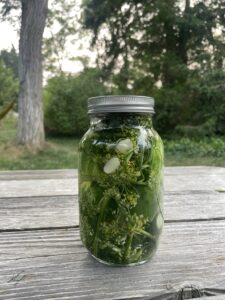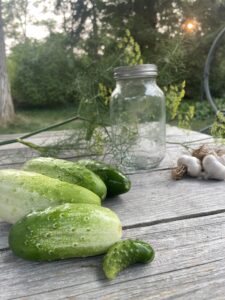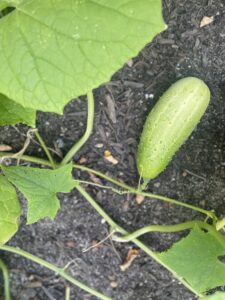When I visit my grandma in Poland, she always prepares a meal that’s more than I can eat. Saying no to her cooking is not an option, though: food is her love language. A traditional Polish dinner typically includes two courses and dessert. My Babcia Jasia usually starts us off with a delicious chicken soup with homemade noodles. The second course might be pierogi or a chicken leg with potatoes. And there are always homemade pickles.

The smell of Grandma’s pickles always brings back a fond memory from my high school days. Two friends and I would walk to a small corner store after school to buy fresh rolls and pickles. The shopkeeper fished the pickles out of a large barrel and packed them into small plastic bags for us. Then, during our bus ride to the city center, we’d devour the pickles and rolls, often drawing disapproving glances from other passengers. I still remember a lady who tsk-tsked our snack. No matter: it was our favorite after-school treat and, besides, it cost us just 50 cents.

My grandmother’s pickle-making tradition has been passed down to my uncle, my mother’s younger brother, Janusz Góral. He continues to honor the family recipe, though he’s made a few adjustments — which Babcia Jasia approves, I should add. She once said his pickles were “quite good,” a compliment that made my uncle rightly proud. My grandma is the best cook I know, and it’s hard to impress her.

With cucumbers taking over our garden, I called Uncle Janusz to get his pickle-making tips. He talked about the importance of choosing cucumbers that are grown without chemicals and not too large — his recipe calls for them to be only 5 to 7 centimeters long, just 2 or 3 inches. He advises soaking just-picked garden cucumbers in cold water for 20 minutes to remove any dirt. Then he thoroughly cleans his one-liter jars and places a layer of fresh dill — stems, flowers, and all — and three whole peeled garlic cloves at the bottom of each. He repeats that layer on top, too. According to my uncle, when it comes to pickles, there can never be too much dill.

These pickles are fermented, not infused with vinegar. That is, as Sandor Katz explains in Wild Fermentation, they get their tang from lactic rather than acetic acid. The cucumbers need time to ferment, so set the jars in a dark, cool place. If you have a spot that’s steadily below 65° F they can ferment slowly for as long as four months. In a warmer kitchen you’ll have to keep the fermentation shorter. They’ll turn from bright to duller green and develop the proper sourness over time. Taste them. If they start to go soft, put them in the fridge.
UNCLE JANUCZ’S WINTER DILLS
Makes 1 quart of pickles
1 clean quart jar with a lid
1 quart water
2 Tbsp. sea salt or kosher salt
1¼ lbs. Kirby or other small garden cucumbers
1 big handful fresh dill with its flowers
6 cloves garlic
- Clean the cucumbers, making sure to scrape off any remaining bit of blossom and clean the jar(s). Measure a quart of cold water and add the salt, stirring to dissolve well. (Uncle Janusz recommends taking half a glass of water from the recipe, mixing it with the salt to dissolve it well, and then adding it back into the cold water.)
- Put half the fresh dill and its flowers into the jar. Add 3 whole peeled garlic cloves. Then pack the cucumbers into the jar. Top with the rest of the dill and 3 more garlic cloves.
- Pour the brine into the jar. It should cover the cucumbers, herbs, and garlic. (If it doesn’t, mix up more brine using the 1 quart to 2 Tbsp. proportions.) Leave a little space between the brine and the cover to allow for expansion during fermentation.
More Pickling Tips
- Fermentation guru Sandor Katz, in Wild Fermentation, recommends cutting a chunk of a bigger cucumber and placing it on top of everything in the jar to keep the pickles submerged. He does not seal the lid tightly (that allows carbon dioxide from the fermentation to escape) and scrapes off the white surface scum if it forms (you don’t have to get it all; it’s wild yeast and it won’t hurt you to eat some of it).
- In a warm summer kitchen, Katz checks the pickles daily because they can sour in as little as a week and need to be moved to the fridge.
- Katz also recommends adding a few clean, fresh grape or green oak leaves to the jar. The tannins in the leaves helps keep the pickles crunchy by slowing the enzymes that soften the pickles.
- You can make an unfermented low-salt version of Janusz’s dills: use half the salt called for in the recipe and just let the cucumbers brine for a day or so; they will last about a month in the fridge.
